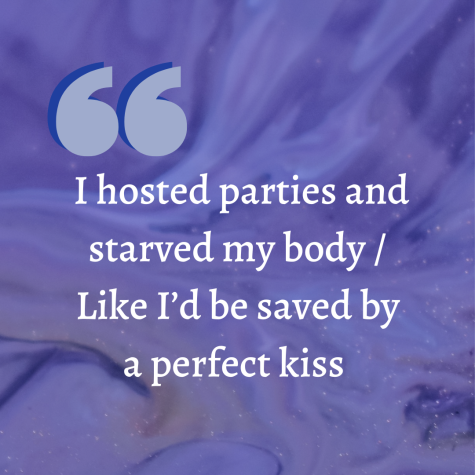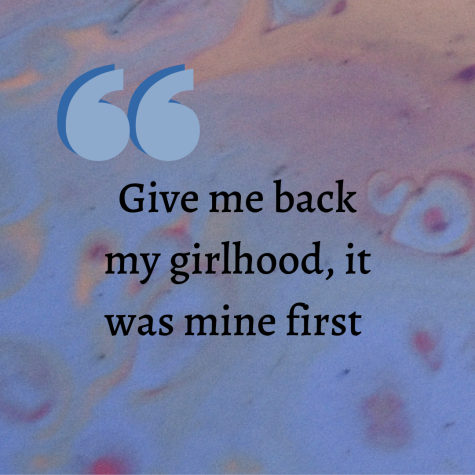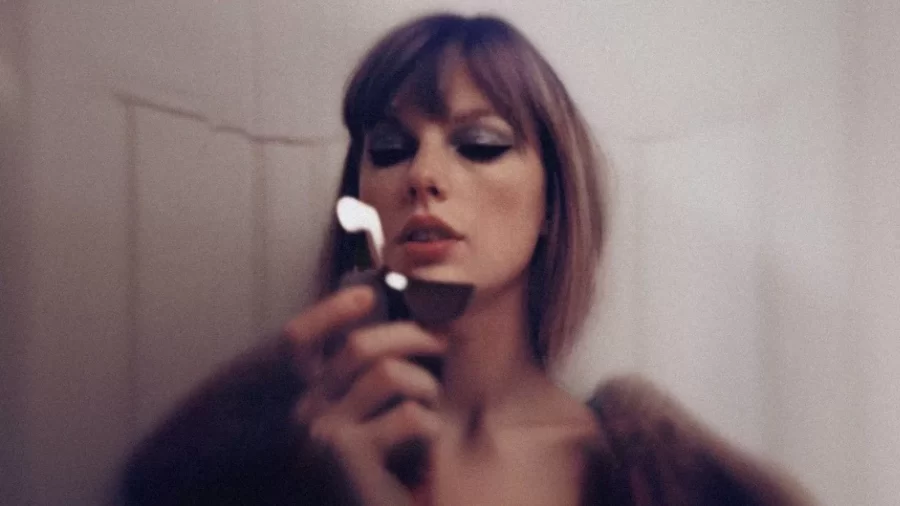Taylor Swift flawlessly returns to pop with “Midnights”
“Midnights” manages to both complement and diversify the singer-songwriter’s discography
The “Midnights” album cover features Taylor Swift clicking a lighter, with the flame to her face
October 26, 2022
Two years after the release of her uncharted folk-alternative albums “folklore” and “evermore,” singer-songwriter Taylor Swift returns to bedroom pop in her tenth studio album “Midnights,” released Oct. 21.
The album opens with “Lavender Haze,” hooking listeners in with a strong drumline and supporting background vocals. The track’s first lyrics are “meet me at midnight,” a perfect introduction to the album’s night pop genre. The upbeat production and lyricism about a new love is reminiscent of Swift’s 2019 song “I Think He Knows” and sets the stage for a constant throughout the album— Swift’s distinct breathy vocals.
Track two, “Maroon,” falls back to Swift’s strength of storytelling through descriptive language and incorporation of dialogue, digressing perfectly from the upbeat opener of “Lavender Haze” to a tone of vulnerability for the rest of the album. Although the lyrics’ specificity to Swift’s life experiences prevent them from being entirely relatable for listeners, the lyricism’s incorporation of various shades of red serve as a metaphor for the universal feelings of passion and lust in a relationship, making the track universal for many. The simple melodies in the song’s beginning make the bridge even more impactful, as Swift stresses lines like “That’s a real f—ing legacy.” Through the use of profanity in the album, Swift deviates from her family-friendly image, and fully commits to lyricism that matches the honest tone of the music she wants to create.

Then through track five, “You’re On Your Own, Kid,” Swift tackles the bittersweet nature of growing older, narrating the story of someone who longs to leave their small town. On the track, synths ramp up until the bridge, progressively increasing in volume and melding with Swift’s voice to push the story forward. The bridge successfully narrates a life-changing realization — with the protagonist realizing how they’ve grown and reflects on the trauma from their formative years — by combining lyricism, escalating synths and Swift’s vocals. All of Swift’s albums feature an emotional track five and through the incorporation of “You’re On Your Own, Kid,” “Midnights” follows the trend.
The next track, “Midnight Rain,” slightly strays away from the emotional journey of track five and leans into a soft, groovy tone. The song’s intro utilizes voice modulation to pitch down Swift’s voice and make her sound more masculine, almost like the echo of a partner in a relationship. The transition between her modulated and normal voice is made beautifully seamless by the constant beat and light production. When Swift sings the third chorus, it feels like a release — her turn to tell the story. Characterizing one partner as “sunshine” and the other as “midnight rain” paints a narrative that many listeners have connected to other pieces of media. “Midnight Rain” defines “Midnights” — not only does it contain the album’s name, the outro, which repeats, “I never think of him except on midnights like this,” echoes a central theme of the album’s vulnerability.
Track eight, “Vigilante Sh-t,” pairs deep, layered vocals with a dark trap beat to create a tone similar to that of Swift’s sixth album, “reputation.” As the hi-hat drums are added, the lyrics become gorier with the retelling of a man who committed many wrong deeds, alluding to Scott Borchetta and Scooter Braun, who had sold Swift’s first six album’s masters. The song feels more hip-hop than pop, lacking a distinct upbeat chorus and repeating similar, effective melodies. Swift’s vocal inflection — the way she executes the end words of each lyric — shines in this track, creating a dark and vengeful tone leading up to the slight snicker when she finally states the track’s name in “I’m on my vigilante sh-t again.”
On Oct. 21, Taylor Swift posted a TikTok featuring her newest song “Vigilante Sh-t”
But on the tenth track, “Labyrinth,” the transition between the verse and chorus is incredibly impactful due to the intense drums being muted to emphasize the repeated lyric in the track’s chorus — “Uh oh, I’m falling in love again.” The abrupt reverse to the similar pitched down voice as in “Midnight Rain” after the song’s third chorus is what makes this track stand out. The rhythm of the drums changes to support Swift’s scared tone when she realizes she’s in love. When Swift’s natural vocals are added to the same repeated lyric, creating an angelic harmony and also making the song sound reflective of past loves.
Released three hours after the album’s official release, the seven additional tracks in “Midnights (3am edition)” uncover a rawer realm of emotions, with a prime example being “Would’ve, Could’ve, Should’ve.” Highlighting the loss of her innocence at 19, the track serves as an extension of “Dear John,” the fifth track of her album, “Speak Now,” as both tracks allegedly discuss Swift’s regrets from her relationship with country singer John Mayer. The lyric “give me back my girlhood, it was mine first,” in the third verse of the track is sung as a gut wrenching plea, a contrast from the rest of the song’s matter-of-fact tonality.

However, the album falls short in a couple of tracks. One example of this is the flawed lyricism in track three, “Anti-Hero.” Despite covering anxieties similar to those in “The Archer,” track three’s incorporation of the lyric “Sometimes, I feel like everybody is a sexy baby / And I’m a monster on the hill” causes the track to become cringe-worthy, taking away from the rest of the song’s overall meaning. Though the track is catchy and some of its lyrics truly meaningful, the execution of certain lyrics fails to impress, establishing the track as a sore thumb compared to the rest of the album.
Track four, “Snow On The Beach (feat. Lana Del Rey),” is another miss. Unlike indie singer Phoebe Bridgers’ large feature on “Nothing New (feat. Phoebe Bridgers) (Taylor’s Version) (From The Vault)” from Swift’s 2021 release “Red (Taylor’s Version)”, track four “Snow On The Beach (feat. Lana Del Rey) consists of Swift dominating the track, with Del Rey only singing the background vocals. However, similar to what was seen in Bridgers’ and Swift’s collaboration, the merge of Del Rey’s and Swift’s vocals and artistic personalities had the potential to make a stellar song — although “Snow On The Beach (feat. Lana Del Rey)” is far from awful, the fact it had the potential to be so much better ultimately taints the track.
On all other fronts, “Midnights” refuses to disappoint. Swift incorporates novelty through discussion of deep topics — anxieties, fears, insecurities and traumas — that she’s rarely covered before, demonstrating how, although Swift has been in the music industry for over 16 years, she’s here to stay for many more.
4/5



















